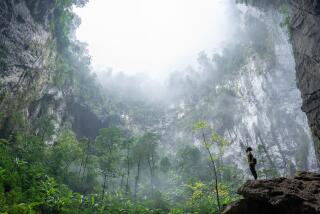A Deep Experience
- Share via
RICHMOND, England — David Attenborough’s new natural history series, “The Blue Planet,” an exploration of the world’s oceans and seas, could hardly have had a less fortunately timed world broadcast premiere.
The BBC aired its first episode on Sept. 12, the day after the most shattering events in recent history. “It seems dreadful to suggest there are these terrible events, that you have a titanic problem on that scale and on the other hand you have this program out, and you worry no one will notice it,” he said. “But I have to admit it did occur to me.”
In fact, something astonishing happened. “The Blue Planet” aired as scheduled. Not only did critics rave, but millions of Britons found themselves deeply moved on that emotional day by its remarkable footage of marine life, including a breathtaking sequence of a blue whale, the largest animal that has ever lived on Earth, plowing through the Pacific waters off San Francisco at 30 miles an hour.
Thousands of viewers sent letters and e-mails to the BBC, expressing appreciation. “The extraordinary thing was, they got a high audience,” Attenborough said. “I must be careful not to be too portentous about this, but on Sept. 12, it was the one thing you could look at on television in which human beings played no part, and which would be going on no matter who was bombing whom. It gave people some solace.”
In retrospect, Attenborough can see why “The Blue Planet” had such a profound effect on a day of such global turmoil. He has long been aware that part of the success of natural history series on TV is an appeal that borders on the spiritual.
“That factor heightens the undercurrent of natural history programs,” he said. “They are one of the few things on TV which have nothing to do with human politics or people trying to sell you something. The natural world is beautiful, it’s unpredictable, and it’s also true in a profound sense.
“We try to present it as it is. Our sin is that we don’t want to put human beings in the picture, and of course in reality they are in the picture. What human beings do affects the animal kingdom. The picture we convey is of wild nature, as if human beings are not included. That’s a distortion, an illusion. But the consequences are that we as program makers benefit from the perception that there are no human beings [on screen].”
Now American viewers have a chance to see “The Blue Planet,” starting Sunday on the Discovery Channel, which co-produced the series with the BBC. Even by the standards of Attenborough’s upscale natural history series, this one is lavish and expensive. It took five years to make and was filmed in 200 locations worldwide. It reveals extraordinary marine life and behavior that had never before been captured on film and filmed some species that were only recently known to scientists.
Many of these hitherto unfilmed creatures inhabit the deep ocean, more than 3,000 feet below the ocean’s surface, where they survive without light. They included the winteria, a fish with extraordinary tubular eyes designed to look upward to spot silhouettes of potential prey, and the hairy anglerfish, which is covered with antennae that are sensitive to the most minute movements in the water.
To film these creatures, cameramen had to be lowered in special submersibles, tough enough to withstand the extraordinary pressure at that depth. “There are only six or seven in the whole world that can go down that far,” he noted.
This year marks Attenborough’s 50th in the television industry, and he is arguably Britain’s most revered broadcaster, a TV figure as important here as Edward R. Murrow or Walter Cronkite is to Americans. Attenborough first appeared on the BBC in 1954, presenting a nature program called “Zoo Quest,” and though he took a seven-year break behind the cameras as a senior BBC executive, his preeminence as a nature series presenter has never been questioned.
Attenborough believes natural history series on TV are a response to the kind of desire to gaze upon nature that so absorbed Henry David Thoreau, Jean Jacques Rousseau and William Wordsworth: “The contemplation of a natural world in which we play no part has a spiritual component, which is why we do it. The subject has this awfully powerful appeal.” “The Blue Planet” proposes the view that the world’s oceans are a kind of last frontier, one that covers 70% of the planet yet is largely unknown. More than half the Earth’s surface is covered by ocean more than a mile deep, and light never penetrates.
“Logistically, it was tough and expensive,” Attenborough says. “I know from experience that anything you do with boats means you multiply production costs by three. Working on boats just takes forever.”
Attenborough lives in a rambling house in this affluent suburb on the river Thames, west of London; artifacts from his travels all over the world lie dotted around the ground floor rooms.
Dressed in a cardigan sweater, open-necked khaki shirt and casual slacks, he is very much off duty, but his on-camera manner is never far away; a kindly man with a dry sense of humor, he often leans forward to make a point with great intensity and seems always to make sure the listener has understood him.
Attenborough is 75, and it seems logical that he might be thinking of scaling back his globetrotting. But one sequence in “The Blue Planet” shows him with a big grin on the deck of a crew boat, plunging through waves as it tries to keep up with the rapid progress of a blue whale just ahead. Indeed, he has no intention of quitting and, while also writing his autobiography, he is preparing his next major series, which will be about mammals.
“People think mammals and animals are synonymous,” he said dryly. “So this one will feature all the ‘pattables’ and ‘cuddlies.’ It’s what people want to know about. People don’t really want to know about animals they have never heard of. Though I’m deeply keen to do programs about them: olingos, cacomistles, gundis.” He rolled the unfamiliar words around his mouth.
Attenborough has two areas of concerns for the future of natural history programming: style and funding.
“These days, there’s a stylistic nervousness,” he noted. “Style is more implicit than we recognize. There seems to be a need to speed everything up. The shows I did more than 25 years ago we would now find slow and wordy.
“But the subject matter doesn’t change. Some of it is so powerful it’s impervious to style. If you see a lion killing a wildebeest and it’s well shot, it doesn’t need style.”
The kinds of series Attenborough makes may never make it to US network television, but they are shown on mainstream channels in other countries, including Britain. His groundbreaking 1979 series “Life on Earth” was seen by 500 million people worldwide, made a fortune in video sales and is still used as a teaching aid in universities.
He is more perturbed by the threat of a multi-channel TV universe to his brand of expensive nature shows: “If you have 30 networks rather than just three, that means everyone gets 10% as much money. As it is, the BBC couldn’t contemplate making these series without an American co-producer.” He sighed.
“I worry. I doubt if there will be many more budgets available to do anything comparable to ‘Blue Planet.’”
“The Blue Planet” parts 1 and 2 air Sunday night at 9 on Discovery, with parts 3 and 4 airing Monday, also at 9. The network has rated it TV-G (suitable for all ages).
More to Read
The complete guide to home viewing
Get Screen Gab for everything about the TV shows and streaming movies everyone’s talking about.
You may occasionally receive promotional content from the Los Angeles Times.






